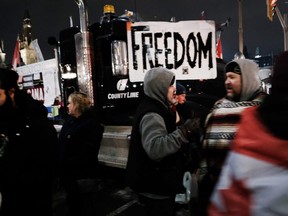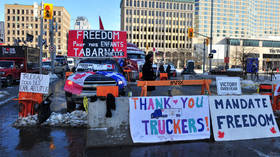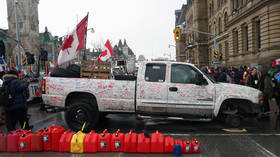Heather Marcoux - Today's Parent - Yesterday
This morning I walked my first grader to school and watched as they took off their toque at the door, slipped the loops of their mask over their little ears, and disappeared into the school.
But starting Monday, kids in Alberta won’t have to wear masks in schools, not even the flimsy, paper-thin ones recently provided by the province. I never expected this disappointing government to pony up N95s for our kids, but I also didn’t expect it to just discontinue COVID precautions at a time when paediatric hospitalizations continue to climb.
In the span of 30 days, the Alberta government went from promising free masks for school children to telling kids that masks are unnecessary. During that same time period, paediatric hospitalizations increased.
The reality of the COVID crisis didn’t change over the last month, but the denials of reality got louder and more extreme.
While my six-year-old was getting their second vaccination, adults were throwing a tantrum at the Coutts border crossing. While my six-year-old was missing out on birthday parties, extremists were partying in Ottawa. While my six-year-old was reading in their classroom (which I have never been allowed to visit, due to COVID), protesters entered another school, yelling about masks and freedom until RCMP officers removed them.
As tensions rose, Alberta’s education minister, Adriana LaGrange, came out of hiding long enough to tweet that “schools are not an appropriate place to protest public health measures,” but within days of that tweet, protesters got what they wanted. The education minister barred school divisions from enforcing their own mask mandates.
Even as paediatric hospitalizations continue to climb in Alberta, even as our emergency departments are stretched far beyond capacity, Alberta’s government is giving in to people because they are loud and scary.
This terrifies me. What will these groups, this melting pot of white supremacists, anti-vaxxers, QAnon believers and so-called “working-class Canadians” demand next?
As a parent, I know that giving in to tantrums or threats teaches children that hurting others is a great way to get what they want. On the surface, it seems like the United Conservative government doesn’t understand that rewarding bad behaviour will only encourage more bad behaviour, but I think they do know that and some of them would love to see more disruptive demands for power.
Jason Kenney has lost control of his caucus. He’s sat by while some of his MLAs have flaunted health measures and supported protests aligned with alt-right, white supremacist ideologies, protests that we know would not be tolerated if the faces behind the steering wheels weren’t white.
The groups protesting at schools, at Coutts and in Ottawa don’t just want COVID safety stopped. They want control. And they’re getting it.
Don’t talk to me about freedom while taking my child’s away
Removing the masks may be just the tip of the iceberg when it comes to caving to extremists, and that scares me the most—more than COVID, even, if I’m being honest.
I actually think the chances of my child contracting COVID are low. At six years old, my kiddo has a pretty good immune system and is old enough to be double vaccinated. Most of their closest friends are also double vaccinated. I can’t know how many of their classmates are, though, and that keeps me up at night.
So does worrying about my nephew (who is still too young to be vaccinated), our older, immunocompromised loved ones, and those with disabilities. What if my child goes to school unmasked, and comes home with COVID? What if we give it to someone and they die? We’ve only recently started seeing people and doing things again, and now we have to choose between school and our loved ones—again.
My child has given up so much over the course of this pandemic. They’ve started doing this thing where they refer to pre-pandemic life as “my childhood.”
They’ll point out the car window and say, “that’s the building where I played soccer in my childhood!” or (the more heartbreaking) “Mom, I miss my childhood.”
“Yes, but you’re six,” I tell them. “You’re still experiencing your childhood,” I say before my eyes well up too much to keep looking in the rearview mirror.
We gave up so much when others wouldn’t. I’m terrified that they’re going to take school from us, too.
Learning to live with COVID
In Premier Kenney’s own words, “now is the time to begin learning to live with COVID.” But the thing is, we were already learning to live with it, finally, because we were able to protect ourselves through things like mask mandates and the proof-of-vaccine program that ended this week.
Because of that program, I recently started taking my child back to the indoor swimming pool for the first time in years, comforted by the knowledge that adults in the pool had either presented proof of vaccination or proof of a negative test at the door. Can we risk swimming, now that it’s a free-for-all? How do I tell my child that their freedom, their safety, their chance to resume childhood, was taken away because some grownups honked their horns a lot?
Do I send my child to school on Monday? I don’t know. I just know that I’m scared.
Some Edmonton parents say they are shocked, baffled and angry that the Alberta government is eliminating mask mandates in schools.

© Graham Hughes/The Canadian Press
When the restriction ends next Monday, Alberta's education minister says school boards will also lack the authority to adopt their own masking rules – a change from last year.
The Tuesday announcement prompted calls from parents, teachers and Edmonton's public school board to release the evidence that informed the decision as Alberta COVID-19 hospitalizations hover near record highs.
Edmonton parent Eddy Kent says he believes the decision was driven by politics, as the premier wanted to be seen taking a significant step.
"The kids, I think, have just been offered up as a sacrifice because the premier thinks that these children won't be as affected," Kent said.
Mask requirements for children have become deeply divisive, prompting protests in some rural schools, and driving parents to plead with school boards to axe the requirement.
Public health experts say it is one of several effective strategies to help prevent the spread of COVID-19.
More than a dozen members of the United Conservative Party caucus have long been pushing Premier Jason Kenney for less intrusive public health measures. Kenney, whose popularity has slumped in public opinion polls, faces a party leadership review on April 9.
Some other provinces are also loosening restrictions, including Saskatchewan, where school masking will become optional at the end of February.
McKenzie Kibler, an issues manager for the health minister, said in a statement the seven-day averages of COVID-19 test positivity rates are dropping, and wastewater surveillance shows a decrease in virus levels in most regions of the province.
He said health restrictions can have an adverse effect on children.
"Given the very low threat that COVID-19 poses to the health of children it is no longer justifiable to continue to disrupt and restrict the normal lives of kids," Kibler wrote.
Critics say ditching the mask mandate ignores lower vaccination rates among school-age children, and that children can transmit it to people who are more vulnerable.
As of Tuesday, 46 per cent of children aged 5 to 11 had received one dose of a COVID-19 vaccine, and nearly 19 per cent of children in that age group had received two doses. Children under five cannot be immunized.
Edmonton parent Nicola Doherty said she was shocked to hear the mask announcement on the same day Alberta reported 13 more COVID-19-related deaths.
Doherty has three children, aged 12, 14 and 16.
She said the government is sending mixed messages by shipping 16.5 million masks to every student in the province, then, days after they arrived, announcing they're no longer needed.
"It's so soon," Doherty said. "And why? Why now?"
Her 12-year-old daughter still plans to wear a mask to school, she said.
Doherty worries it will lead to her kids missing more school, and their parents missing more work.
Kent, who has a 13-year-old son and 10-year-old daughter, said he doesn't know how to justify the change to his kids.
Kent says removing mask mandates from a demographic with low vaccination rates is illogical.
His kids are worried about whether their friends will be wearing masks, and whether those choices will cause social tensions.
School boards surprised by move
Edmonton public school board chair Trisha Estabrooks said Wednesday trustees were blindsided by the news.
"This is too much change, too quickly, and again – no consultation with school boards," she said.
Some families who chose to shift their children back to in-person classes with restrictions in place may feel wronged, she said.
Edmonton public will continue to encourage students to wear masks, she said.
Darren Mazutinec, superintendent of Westwind school division in southern Alberta, said there are no pandemic approaches that can please everyone.
"Whether you mask or unmask, our schools are safe havens," Mazutinec said. "We want our students in schools learning with their teachers, and if they're comfortable wearing a mask? Perfect. Wear a mask."
Alberta Teachers' Association president Jason Schilling said with a provincial COVID-19 test positivity rate still at 32 per cent and limitations on who can be tested, the government's move is premature."
He said Omicron is still causing staff shortages in school and the system needs more time to recover.
The provincial government announced Tuesday students aged 12 and under will no longer be required to wear face masks in schools beginning Feb. 14. Local school superintendents report mixed reactions to the announcement, but are not surprised by it.
“We were expecting pretty quick adjustment to the restrictions and measures that were in place,” Mark Davidson, Medicine Hat Public School Division superintendent, told the News. “The government had been signalling as much for the last couple of weeks.”
Dwayne Zarichny, superintendent for the Medicine Hat Catholic Board of Education, told the News he and his staff were also unsurprised by the announcement.
“Certainly other provinces are moving in that direction in tandem with Alberta, so I don’t think we found it surprising.” Zarichny said. “Listening to the data presented last night and which informed the government’s decision seems to make sense these next steps are being taken. And so, it’s a matter of practice our jurisdiction follow the direction that’s given by the chief medical officer of health. If she’s confident that we’ve moved into an endemic stage and they don’t believe the mask is necessary, then we’re confident in her judgment.”
Not all individuals connected to schools share that confidence, however. Davidson confirmed to the News, he has received mixed feedback from individuals, some happy masking will no longer be required and others who expressed concern, specifically in regards to student health and possible increased transmission.
“I think the challenging part is we’ve been – for two years – working under the premise that all of the measures we’ve had in place were effective in protecting one another from COVID, so there’s a level of concern or reluctance among many because this was a dramatic shift away from what we’ve been doing for so long,” Davidson said. “There’s also people who are not sure it’s the right thing (but) are also happy things are loosening up. We all have complicated sets of opinions and motivations in our lives and I think everybody I talk to has mixed emotions, and has had mixed emotions, at every step of the pandemic.”
Following the premier’s announcement, many Albertans expressed views on the changes to public health measures online.
One teacher reached out to the Alberta Teacher’s Association on Twitter inquiring about the safety of schools once mandatory masking was removed. The tweet read: “Can the ATA help teachers navigate being forced into unsafe workplaces? Steps have been taken to actively make schools less safe after the 14th. Do we have any rights or freedoms regarding a safe work/learning environment?”
ATA vice-president Greg Carabine responded to the tweet and stated the ATA’s Teacher Employment Services would be consulting with legal representatives.
Kenney then tweeted a picture of the exchange with a caption which read, “Disturbing to see the teachers union thinks unmasked kids create ‘an unsafe workplace,’ and is threatening legal action to force kids to wear masks indefinitely. Almost all Alberta teachers are triple vaccinated. Treat kids like kids, not ‘unsafe’ vectors of transmission.”
When asked about the premier’s response during a Wednesday press conference, ATA president Jason Schilling stated, “I find his remarks are equally as disturbing. There’s a lot of tension, stress and anxiety out there right now. I heard from teachers who’ve been harassed … principals who’ve been threatened. I’ve heard from individuals anxious about what is going on in schools. And to have the premier target two individuals in this way, specifically in his tweet, and to throw it back into the face of teachers, after just saying in a press conference that we need to come together, we need to work together to overcome what is happening in COVID, and then to turn around and target teachers this way is despicable behaviour … We should be working together.”
In the same press conference, Schilling encouraged Alberta’s government to slow the removal of public health measures in schools.
“Teachers – like most Albertans – are tired of the pandemic, but they’re also worried about the speed at which the government announced the removal of the one protection that was available to all students in all grades; masking,” Schilling said. “A return to a normal school setting is something everyone is hoping for, however we do not want a hasty decision to put us a step backwards in just a few weeks.”
While students younger than 12 will no longer be required to wear masks in schools, they are welcome to do so if they wish. Both of Medicine Hat’s school divisions will provide masks, using those supplied by the province’s government earlier in 2022.
KENDALL KING, Local Journalism Initiative Reporter, Medicine Hat News









